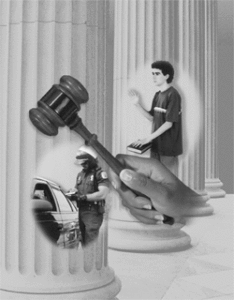 A recent news story reported the arrest of a 14-year-old boy for DUI (called ‘OVI’ in Ohio). It is somewhat unusual for a juvenile to be charged with OVI in Ohio. When a juvenile faces an OVI case, some aspects are the same as adult OVIs and some components are different. Those components include the investigation, the court process, and the penalties.
A recent news story reported the arrest of a 14-year-old boy for DUI (called ‘OVI’ in Ohio). It is somewhat unusual for a juvenile to be charged with OVI in Ohio. When a juvenile faces an OVI case, some aspects are the same as adult OVIs and some components are different. Those components include the investigation, the court process, and the penalties.
Investigations for Juvenile OVI
If a police officer suspects a juvenile driver is under the influence, the investigation is essentially the same as an OVI investigation for adults. The officer typically administers field sobriety tests and questions the driver. Although the officer must give Miranda warnings before custodial interrogation of a juvenile, the officer is permitted to question the juvenile without his parent or guardian being present.
If the officer has probable cause to believe the juvenile operated a vehicle under the influence, the officer arrests the juvenile. A common question is whether the level of proof required to arrest a juvenile is lower because juveniles (and all persons under 21) have a lower ‘legal limit’ than persons 21 and over (.02% compared to .08%). In Ohio, some appellate courts have ruled the level of proof required is lower for juvenile, while other courts have ruled the level of proof is the same as for persons 21 and over.
After the arrest, an officer ordinarily asks the juvenile to consent to a breath/blood/urine test. A juvenile does not have the right to the presence of a parent or guardian when deciding whether to consent to a breath/blood/urine test. If the juvenile refuses to consent to a test or tests ‘over the limit’, the juvenile will receive an Administrative License Suspension in addition to the charge of OVI.
Court Process for Juvenile OVI
The court process for juvenile OVI is similar to that for adult OVI, but some of the terminology is different. The first court appearance is a preliminary hearing (arraignment), and the juvenile either admits (pleads guilty) or denies (pleads not guilty). If the juvenile denies the allegation(s), there is a pretrial and a possibly a trial.
One part of the court process which is different for juveniles is the trial. A juvenile does not have the right to a jury trial, so the judge or magistrate decides whether the evidence proves guilt.
Penalties for Juvenile OVI
If the juvenile enters an admission (pleads guilty) or has a trial and is adjudicated a juvenile traffic offender (found guilty), there is a disposition hearing (sentencing). The disposition for a juvenile OVI is different than the sentence for an adult OVI.
The juvenile OVI disposition has multiple parts. First is a fine of up to $250. Second is monitoring of the juvenile on community control (aka ‘probation’). Third is confinement for up to five days in a detention facility or other institution. Fourth is a driver’s license suspension of six months to two years. To reinstate a driver’s license after a juvenile OVI, the juvenile must complete a juvenile driver intervention program, obtain a temporary driver’s license, and successfully re-take the driver’s license examination.
Impact of Juvenile OVI
Juvenile OVI arrests are infrequent. When they occur, however, the consequences can have a significant impact. The parents of a juvenile charged with OVI should consider representation by a law firm with expertise in OVI defense.
 Columbus OVI/DUI Attorney Blog
Columbus OVI/DUI Attorney Blog

